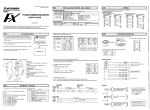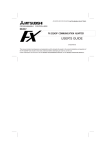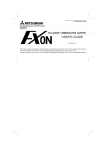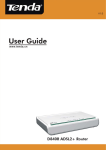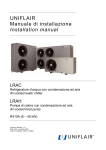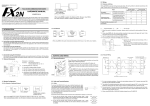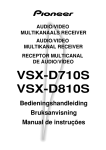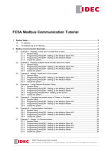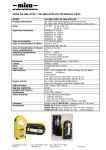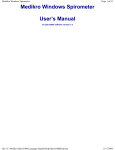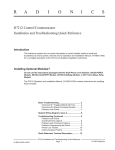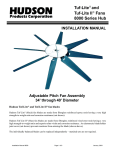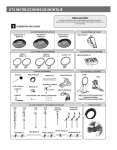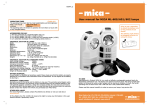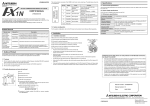Download FX2N-232BD Communication Board
Transcript
3 The control line is set by b12. SPECIFICATION b12 = 0 : No hardware hand shaking. Send and receive are controlled by software protocol. 3.1 General specification b12 = 1 : Hardware hand shaking. Signal lines ER(DTR)and DR(DSR)are used to control send and receive of data. General specifications is same as those for the FX2N series programmable controller. When sending 3.2 Power supply specification FX2N-232-BD COMMUNICATION BOARD USER’S GUIDE JY992D66001A This manual contains text, diagrams and explanations which will guide the reader in the correct installation and operation of the FX2N-232-BD and should be read and understood before attempting to install or use the unit. Further information can be found in the FX SERIES PROGRAMMING MANUAL, FX2N SERIES HARDWARE MANUAL and FX-485PC-IF USER’S MANUAL. 1 b 12 1 Pin No. 3.3 Specification b 11 0 3 SD (TXD) 4 6 The communication board FX2N-232-BD for RS232C (hereinafter referred to as “232BD”) can be connected to the main unit of the FX2N Series programmable controller, and used as the port for the following applications. (1) To perform data transfer between RS232C devices such as personal computers, bar code readers and printers. (2) To perform data transfer using the dedicated protocol between RS232C devices. For details of the dedicated protocol, refer to the users manual of the FX-485PC-IF. (3) To connect a programming tool. And when the 232BD is used for the application (1) or (2) above, the communication format including the baud rate, the parity and the data length is specified by the parameters or the contents of the special data register D8120 of the FX2N programmable controller. Only one 232BD can be connected to one base unit. Accordingly, the 232BD cannot be used together with the FX2N-485-BD or the FX2N-422-BD. When two or more RS232C units are required to be connected for the application, use the special block for RS232C communication. 1 2 3 4 39 24.99(0.98")±0.3(0.012") 54(2.13") 46(1.81") 5 4 ER (DTR) DR (DSR) 6 DR (DSR) 9-pin D-SUB type Pin layout of connector 1:CD(DCD) 2:RD(RXD) 3:SD(TXD) 4:ER(DTR) 5:SG(GND) 6:DR(DSR) 7,8,9:NC(No connection) b 12 1 Pin No. LED indicators RXD, TXD b 11 1 3 SD (TXD) Communication method Half-duplex communication system Protocol Programming protocol, dedicated protocol (format 1 or 4), non protocol 2 RD (RXD) Isolation No isolation 4 ER (DTR) 6 DR (DSR) Diagnostic devices M8121 M8122 M8123 M8124 M8126 M8127 M8128 M8129 M8161 Diagnostic devices Data transmission delayed (RS instruction) D8120 Data transmission flag (RS instruction) D8121 Finished receiving data (RS instruction) D8122 Carrier detection flag (RS instruction) D8123 Global flag (dedicated protocol) D8124 On demand handshake flag (dedicated protocol) D8125 On demand error flag (dedicated protocol) D8127 On demand Byte/Word flag (dedicated protocol) D8128 D8129 Selection of 8 bit operations for applied instructions ASC, RS, ASCI, HEX, CCD (RS instruction) Operation ➁ Connector for programmable controller Contents 0 (OFF) 1 (ON) 7 bit 8 bit b1 b2 Parity b2,b1 (0, 0) : None (0, 1) : Odd ➃ TXD LED : Flashes at high speed during sending. b3 Stop bit ➄ Connector (9-pin D-SUB type) for peripheral unit The top face of this connector is higher than the top face of the panel cover of the programmable controller by approximately 3 mm (0.12") or by approximately 50 mm when the cable is connected. b4 b5 b6 b7 b7,b6,b5,b4 (0, 0, 1, 1) : 300 Baud rate (bps) (0, 1, 0, 0) : 600 (0, 1, 0, 1) : 1,200 (0, 1, 1, 0) : 2,400 Bit No. Communications format (RS instruction, dedicated protocol) Local station number (dedicated protocol) Amount of data to be transmitted (RS instruction) Amount of remaining data already received (RS instruction) Data header <default STX (02H)> (RS instruction) Data terminator <default ETX (03H)> (RS instruction) On demand head device register (dedicated protocol) On demand data length register (dedicated protocol) Data network ‘time-out’ timer value (dedicated protocol) b2,b1 (1, 1) : Even 1 bit 2 bit b7,b6,b5,b4 (0, 1, 1, 1) : 4,800 (1, 0, 0, 0) : 9,600 (1, 0, 0, 1) : 19,200 ➅ Mounting holes of connector <2 - M2.7 (0.11") × 0.635 (0.025")> 0 (OFF) Data Data Data Receive Data WIRING The connector of the 232BD is 9-pin D-SUB (see Section 1.2 and Chapter 2). The connections of RS232C devices varies with each device being used. Check the specification of the device, and connect. 4.1 Connection examples 4.1.1 Terminal specification device RS232C device Uses ER, DR * Uses RS, CS 25-pin 9-pin 25-pin 9-pin Meaning Meaning D-SUB D-SUB D-SUB D-SUB 232BD 9-pin D-SUB RD (RXD) 3 2 RD (RXD) 3 2 2 RD (RXD) SD (TXD) 2 3 SD (TXD) 2 3 3 SD (TXD) ER (DTR) 20 4 RS (RTS) 4 7 4 ER (DTR) SG (GND) 7 5 SG (GND) 7 5 5 SG (GND) DR (DSR) 6 6 CS (CTS) 5 8 6 DR (DSR) * When using ER and DR signals, please also check if RS and CS signals are needed according to the RS232C device's specifications. 1 (ON) None b9 Terminator character *1 None b10 Reserved b11 DTR check (Control line) *4 Send and receive Receive b12 Control line *4 None RS232C device Uses ER, DR * Uses RS, CS 25-pin 9-pin 25-pin 9-pin Meaning Meaning D-SUB D-SUB D-SUB D-SUB D8124 *2 D8125 *3 232BD 9-pin D-SUB CD (DCD) 8 1 CD (DCD) 8 1 1 RD (RXD) 3 2 RD (RXD) 3 2 2 RD (RXD) SD (TXD) 2 3 SD (TXD) 2 3 3 SD (TXD) H/W CD (DCD) ER (DTR) 20 4 RS (RTS) 4 7 4 ER (DTR) SG (GND) 7 5 SG (GND) 7 5 5 SG (GND) DR (DSR) 6 6 CS (CTS) 5 8 6 DR (DSR) b13 Sum check *5 Sum check code is not added Sum check code is added automatically b14 Protocol No protocol Dedicated protocol * When using ER and DR signals, please also check if RS and CS signals are needed according to the RS232C device's specifications. b15 Transmission control protocol *5 Protocol format 1 Protocol format 4 4.1.3 When programming or monitoring Use F2-232CAB-1 and 25-pin D-SUB to 9-pin D-SUB adapter or make a suitable cable. *1 Set to “0" when using the dedicated protocol. *2 Effective only when no protocol (RS instruction) is selected, and has an initial value of STX (02H: Can be modified by the user). 1 Receive 4.1.2 Modem specification device Contents Meaning Header character *1 b8 Send Data To connect the 232BD to RS232C device use an RS232C cable. Make sure that the shield of cables is connected to ground (100 Ω or less). 3.5 Communication format D8120 Meaning Data 4 Operation Data length 35 ER (DTR) Connector b0 6 RD (RXD) Max. 15m ➀ Mounting holes <2-φ 4.0 (0.16")> ➂ RXD LED : Flashes at high speed during sending. 2 Transmission distance Bit No. Dimensions : mm (inches) Accessory : M3 self-tapping screws × 2, mounting bracket × 2 Send Conforming to RS232C To send and receive the data between the RS232C unit using the 232BD, the communication format including the transmission speed (baud rate) and the parity must be consistent between the 232BD and the RS232C unit. The communication format can be set using parameters or the contents of special data register D8120 of the FX2N programmable controller. Make sure to set appropriately the communication format in accordance with the RS232C unit used. For the setting method using the parameters of the FX2N programmable controller, refer to the manual of the peripheral unit used. Make sure to turn off the power of the programmable controller and turn it on again after modifying the setting. 1.1 EXTERNAL DIMENSIONS Pin No. Transmission standard 3.4 Related flag and data registers INTRODUCTION When receiving 5 V DC, 60 mA is required from the programmable controller. 5 MOUNTING PROCEDURE Turn off the power of the programmable controller, and mount the 232BD using the following procedure. TERMINAL LAYOUTS The connector is a 9-pin D-SUB type, and the pin configuration is as shown below. Pin No. 1 6 2 7 Signal Meaning 4 9 5 Effective only when no protocol (RS instruction) is selected, and has an initial value of ETX (03H: Can be modified by the user). *4 Set to (b11, b12) = (1, 0) when using the dedicated protocol. *5 Set to “0" when using no protocol. CD(DCD) Carrier detection ON when carrier is detected for data reception 3.5.1 Example program of setting 2 RD(RXD) Receive data Receive data (RS232C device to 232BD) 3 SD(TXD) Send data Send data (232BD to RS232C device) 4 ER(DTR) Send request Signal requesting preparation for data sending to RS232C device The communication format is set by special data register D8120. Setting the communication format using D8120 is effective only at the time the RS instruction is driven, and therefore if changed after driving, it is not actually accepted. 5 SG(GND) Signal ground Signal ground 6 DR(DSR) Send enable Shows RS232C device is ready to receive NC No connection 7,8,9 ➀ ➁ ➂ Function 1 3 8 *3 Data length 8 bit Parity Even Stop bit 2 bit An example of setting D8120 is shown below. M8002 MOV H138F D8120 H138F = 0001 0011 1000 1111(binary) The settings for the above program are as right. Baud rate 9,600 Protocol No protocol Header Used Terminator Used Control line H/W DTR check Send and receive Remove the panel cover from the top face of the main unit. Connect the 232BD to the board mounting connector provided on the base unit. Fix the 232BD to the main unit using the M3 self-tapping screws provided, fitting the mounting bracket and the round crimp-style terminal with the ground cable as shown in the figure on the right. Make sure that the crimp-style terminal is attached in the direction shown in the figure on the right, and that the ground cable extends from the unit shown in the figure below. Tightening torque: 0.3 to 0.6 Nm (3 to 6 kgf⋅cm) 5.5mm(0.22") or less 2 ➃ For M3(0.14") 4 1 3 Grounding Cable X3 X1 232BD 16mm(0.63") or less Y0 Cut out the hole provided on the left portion of the panel cover using a tool such as nippers and cutter so that the terminal block can be seen. The top face of this connector is higher than the top face of the panel cover of the programmable controller by approximately 7 mm (0.27"). 2 Y2 Y1 6 CAUTION FOR USE 1) When programming tool is connected the 232BD, do not use any other communication format or parameters. If communication format or parameters is set, programming is not possible. 2) Only one programming tool (such as FX-10P, FX-20P, etc.) should be connected to either the programming port or the port provided on the 232BD. If a programming tool is connected to both connectors, the following may occur. a) b) 2) Preparation of software • Use ordinary communication software (terminal emulator) or dedicated program in the personal computer. The communication format of the PC for this example is as follows. Receive When the sampling trace function of the programmable controller is used from both ports, the correct sampling trace result cannot be obtained. 232BD • Use the communication cable suited to the connector pin configuration of the personal computer. (For representative wiring see section 4.) 1) Data length 8 bit Parity Even Stop bit 1 bit Baud rate 2400 FX2N • Send data • Receive data • Receive data • Send data PROGRAM EXAMPLES 1) Make sure that the communication format is consistent between the external unit (RS232C unit) and the programmable controller (D8120). If it is not consistent, correct the setting of the communication parameters or correct the contents of the D8120. When the D8120 is modified, turn on the RS instruction again. When the communication parameters are modified, turn off the power of the programmable controller, then turn it on again. 2) Check the timing for sending and receiving the data. For example, confirm that the counterpart unit is ready for receiving before sending the data. 3) If a terminator is not used, make sure that the send data quantity is consistent with the receivable data quantity. If both quantities are not consistent with each other, make them be consistent. (If the send data quantity varies, use a terminator.) 4) Make sure that the external unit is operating correctly. 5) Make sure that the data format transferred is equivalent. If it is not equivalent, correct it. 6) When the RS instruction is used twice or more in the program, make sure that only one RS instruction is turned on in one calculation cycle. Never set the RS instruction to OFF state while the data is being received or sent. Send The program inside the programmable controller may not be consistent with the program inside the programming tool. If the program is modified or the set value for the timer or the counter is modified, a part of the program may be damaged and the programmable controller may malfunction. 7 8.3 When communication is performed between the computer using the no protocol Connect 232BD and a personal computer, and exchange data with PC. If the communication format of the soft ware cannot be adjusted to this setting, adjust the PC and the software to be the same. 8.4 When the dedicated protocol is used for communication between the computer Sequence program Connecting 232BD and a printer, and printing out the data sent from the PC. 1) Make sure that the communication format is consistent between the computer (RS232C unit) and the programmable controller (D8120). If it is not consistent, correct the setting of either the computer or the programmable controller. When the programmable controller is modified, turn off the power of the programmable controller, then turn it on again. 2) Make sure that the station No. of the programmable controller which is the target of data transfer is equivalent to the station No. set in the communication procedure. If they are not equivalent, correct the wrong one. 3) Make sure that the communication procedure is correct. If it is not correct, modify the setting of the RS232 unit to realize correct procedure. 4) Check whether errors have occurred in the RS232 unit and the programmable controller. For the check method and the countermeasures, refer to the users manual of the FX-485PC-IF. 5) If the RS instruction is used in the program, delete it, turn off the power of the programmable controller, then turn it on again. M8000 0 M8161 Handled by 8-bit data 1 M8002 3 [MOV H0067 D8120] Setting of communication format 2 X000 9 [RS D200 K11 D500 K0] RS instruction drive 3 X001 Send 19 [PLS M0] M0 22 232BD • Receive data [MOV H0074 D200] Writing of send data 4 Herein, "test line" is sent. FX2N [MOV H000D D209] • Send data [MOV H000A D210] • The communication format of the serial printer is as follows. [SET M8122] Send request 5 M8123 Data length 8 bit Parity Even 81 [MOV D500 K4Y000] Output of receive data 6 X002 89 [PLS M1] Receive completion reset 7 M1 Stop bit 1 bit Baud rate 2400 bps Sequence program 92 [RST M8123] 96 [END] Operation M8000 0 M8161 Handled by 8-bit data 1 Power on M8002 3 [MOV H0067 D8120] Setting of communication format 2 Turn on the power of the PC and printer, check the printer is on line and switch the PC to RUN. 1 2 X000 9 [RS D200 K11 D500 K0] RS instruction drive 3 X000, ON X001 19 [PLS M0] M0 22 RS instruction drive [MOV H0074 D200] Turn on X000, and drive RS instruction. 3 [MOV H0065 D201] [MOV H006E D207] X001, ON Writing of send data 4 Herein, "test line" is sent. Data send [MOV H0065 D208] [MOV H000A D210] [SET M8122] Send request 5 Data send [END] Operation Power on Turn on the power of the PC and printer, check the printer is on line and switch the PC to RUN. 1 2 • In this example, CR (H000D) and LF (H000A) are written at the end of the message. The printer moves down one line for each message. 5 Turn on X000, and drive RS instruction. Every time X001 is turned on, the contents of D200 to D210 are sent to the printer, and "test line" is printed. • Under no circumstances will Mitsubishi Electric be liable or responsible for any consequential damage that may arise as a result of the installation or use of this equipment. • All examples and diagrams shown in this manual are intended only as an aid to understanding the text, not to guarantee operation. Mitsubishi Electric will accept no responsibility for actual use of the product based on these illustrative examples. • Owing to the very great variety in possible application of this equipment, you must satisfy yourself as to its suitability for your specific application. DIAGNOSTICS : JY992D66001 1) Manual revision :A Date : JUNE 1997 Make sure that the programmable controller is connected and that the POWER LED is lighted on the programmable controller. 2) Make sure that the VRRD or VRSC instruction is not used in the program. If such an instruction is used, delete it, turn off the power of the programmable controller, then turn it on again. 3) When the special auxiliary relay M8070 or M8071 is turned on, turn off the relay using the peripheral unit, turn off the power of the programmable controller, then turn on the power again. 4) Make sure that wiring is performed correctly. Refer to Section 4. 5) Make sure using the peripheral unit that the communication parameters are set correctly in accordance with the application. If the setting is not correct, set the parameters correctly using the peripheral unit. HEAD OFFICE:MITSUBISHI DENKI BLDG MARUNOUCHI TOKYO 100 TELEX:J24532 CABLE MELCO TOKYO HIMEJI WORKS:840, CHIYODA CHO, HIMEJI, JAPAN 8.2 When the parallel link function is used 4 5 7 • If in doubt at any stage during the installation of the FX2N-232-BD always consult a professional electrical engineer who is qualified and trained to the local and national standards. If in doubt about the operation or use of the FX2N-232-BD please consult the nearest Mitsubishi Electric distributor. Manual number 3 X001, ON 6 • This manual has been written to be used by trained and competent personnel. This is defined by the European directives for machinery, low voltage and EMC. 8.1 Common items CR : Carriage Return LF : Line Feed Data send After receiving and storing data from personal computer in D500, it is output to Y000 to Y017. When input X002 is turned on, the receive completion flag is reset. 8 X000, ON RS instruction drive 4 Personal computer operation [MOV H000D D209] 80 Every time X001 is turned on, the contents of D200 to D210 are sent to the personal computer, and "test data" is displayed. Guidelines for the safety of the user and protection of the FX2N-232-BD Note: It may be necessary to set the DIP switches of your printer. Check your printer manual for how to configure the serial communications. 1) Make sure that the communication format is in the initial state (D8120 = K0). Check using the peripheral unit how the communication parameters are set. If the no protocol (RS instruction) or the dedicated protocol is selected, set the parameters correctly using the peripheral unit. 2) If the RS instruction is used in the program, delete it, turn off the power of the programmable controller, then turn it on again. JY992D66001A Effective JUN. 1997 Specifications are subject to change without notice


